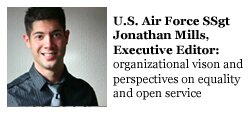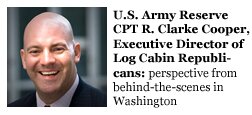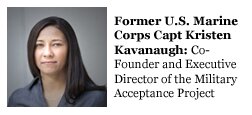By Jeremy K. Johnson
It was two years into George W. Bush’s second term. I just couldn’t muster that much faith. My last day was in Spring of 2007. Like thousands of others, I gained a “scarlet” DD-214 discharge paper and was marked RE-4 (ineligible for service) due to “homosexual admission.”
I have said repeatedly of that last assignment over the years that I felt wanted as a Sailor, but unsupported as a human being. It was lonely, even among colleagues, and I eventually broke down under the overlapping stress of being gay and serving in uniform. There were things I simply could not explain to my chain-of-command, my friends, or even a military doctor.
When I finally left, I realized that despite my pain, I had become numb to genuine emotions. Even today, I struggle to connect with real moments of joy, sorrow, pride and kinship. I continue to fight back the remnants of what the Navy did to me emotionally – and that was forcing me to compartmentalize my own emotions and needs for the sake of maintaining DADT.
As proof, I offer this gem. I had a former student who is now a friend tell me shortly after I came out to the Navy that she never suspected. “I always thought you were just an asshole.” That was revealing to me because until that moment, I didn’t realize how much effort I had put into not being “suspected.” I worked hard to be accepted by playing the “normal” guy as best as I could.
So, maybe it comes as no surprise to you now when I tell you that after repeal passed in December of 2010, I did not cry. I was happy, but not overjoyed.
And when the certification letter was signed in July of 2011, I was excited, but not overwhelmed with emotion. And I did not cry.
When the day finally came for repeal, and the clock turned over, I sat overwhelmed, but numb to the consequence… I was busy finalizing paperwork for reenlisting and again, I did not cry tears of joy.
Two days later – when I stood on the pier of a small dock in Baltimore and let some officer I’d never met administer the oath of enlistment so that my paperwork could be approved – I did not cry.
At my formal ceremony – when the man who accepted my coming out letter administered the oath again so that my friends and family could share the moment with me – I did not cry.
When I received my new ID card, when I put on the uniform for the first time, when I received the assignment I wanted, when I was asked to be a co-lead of OutServe National Capital Region, when I found out I was eligible for promotion to Chief Petty Officer, when I successfully completed Fleet Week New York with high marks, when I marched in Capital Pride with more than 20 other LGB service members… none of these moments made me cry. I was happy, but nothing was able to wrest control of those deep-seated fears about expressing raw and unfiltered happiness… Until June 15.
I woke up yesterday morning to see in my Facebook feed a note about the Secretary of Defense speaking to LGBT troops and DoD civilians in a video online.
Halfway through the day, I watched it twice. I was dumbfounded at what I heard. It was a statement designed to emphasize the need for the fair treatment and dignity for all service members. It was wonderful, but I did not cry… I was too busy for that.
And after an already long day, I sat down at my computer (it was a slow duty night for Navy reserve) and watched it for a third time. And a few small tears finally fell. As I watched it for a four, fifth, sixth and seventh time… I listened carefully to the words being spoken and my new reality finally hit home.
I AM accepted.
I AM supported.
I AM wanted by the Navy and by my peers as a teammate.
The Navy I left 5 years ago is now forever behind me. There are still challenges to be overcome, but the military leadership, from the very top, has now made it clear in no uncertain terms that they are there for me just as they are for everyone else. THAT makes all the difference.
There’s still work to be done, but they can’t change the law. I know that. What they can do – they’ve just done. They’ve set the tone for professionalism, dignity, and integrity.
If it was at all possible… after I cried… I became more proud than I have ever been before; I became more proud to serve my country.



























